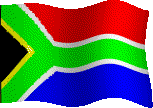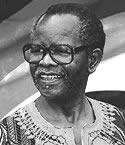























|

|

|

|

|

|

|

|

|

|

|

|

|

|

|

|

|

|

|

|

|

|

|
|
|
|

|
|
|
OLIVER REGINALD TAMBO |
|

|
|
|
Oliver Tambo was born on October 27th 1917 in the town of Mbizana in East Mpondoland, South Africa. At the age of 7, he started off his elementary education at Ludeke Methodist School in his hometown before transferring to the Holy Cross Mission where he completed his elementary education. He then proceeded to St Peters College in Johannesburg for his High School Education. After completing his High School education, he proceeded to Fort Hare College to pursue a Bachelor of Science Degree. It is at Fort Hare that he ran into Nelson Mandela and established a friendship with him that would last for the rest of his life. In 1940, while trying to further his education after obtaining his B.S Degree, Tambo was expelled for being one of the organizers of a student boycott to demand the formation of a Student Representative Council at Fort Hare. His good friend Mandela was also expelled during the same incident. After Tambo's expulsion from Fort Hare, he took up a teaching job at his former school in Johannesburg and in 1942, ran into Walter Sisulu, who introduced him to the African National Congress(ANC). In 1944, together with Sisulu, Mandela and others, they formed the ANC Youth League, a radical wing of the ANC. The Youth League was opposed to the "polite" tactics employed by the ANC old guard, arguing that they would never attract the attention of the white establishment. They proposed a "more aggressive" approach in dealing with the white establishment. The Youth League at first seriously rocked the ANC boat, but after numerous examples of the government's insensitivity to calls for a more representative democracy in South Africa, many South Africans grew sympathetic to their cause. After the 1948 all-white elections, the ANC could no longer tolerate the government's insensitivity and in 1949, resolved to adopt the Youth League's Programme of Action as official party policy. The Programme of Action advocated strategies like strikes, boycotts, civil disobedience and non-cooperation in dealing with the white government. In 1955, Tambo ascended to the post of Secretary-General of the ANC after Walter Sisulu was forced to step down by the white government. You will remember that after the 1952 Defiance Campaign of 1952, Sisulu was arrested, convicted and branded a Communist by the government. However due to the non-violent nature of his offense, his sentence was suspended for 3 years. This meant that in 1955, under the Suppression of Communism Act, he would be barred from holding any public office. Tambo remained ANC Secretary-General until 1958, when he was appointed ANC Deputy President. In 1960, after the government banned the ANC for its demonstrations against the segregationist pass laws, the party leaders designated Tambo to take the ANC gospel abroad, and campaign in exile against apartheid. While abroad, Tambo kept up the ANC fight and secured military training and equipment for the ANC military wing Umkhonto We Sizwe from various African countries. Tanzania, then under Julius Nyerere, and Zambia, were among the African countries that gave Tambo and the ANC the much needed assistance. The famous Rivonia Trial in which Mandela, Sisulu and others are sentenced to life found Tambo abroad. He continued living in exile and in 1967, was appointed acting ANC President. His Presidency was confirmed in 1969.
As President, Tambo took the ANC gospel to the floor of the United Nations and other international forums. This led to the United Nations Declaration in 1973 that apartheid "is a crime against humanity". In a show of approval of the good work Tambo was doing as ANC President, he was re-elected President in 1985, and vowed to step up even further the party's armed struggle. The ANC suffered a major set back in 1989, when their charismatic leader Tambo suffered a stroke, requiring extensive medical treatment. He survived the stroke and in 1990, 30 years after his exile began, his prospects of returning home alive were substantially boosted by the release of his long time friend Nelson Mandela from prison. Tambo ended his exile on 13th December 1990, returning home to hero's welcome. During the 1991 ANC National Conference, Tambo still ailing from the effects of his 1989 stroke, handed over Presidency of the ANC to Nelson Mandela and assumed the honorary post of National Chairperson. During the same conference, Sisulu became ANC Deputy President. Disaster finally struck on 24th April 1993 when Tambo died of Stroke. His death was sadly received around the world, and particularly in his native South Africa, where it was widely felt that he should have been able to live longer and reap the fruits of freedom and democracy that he had so earnestly sewn. Nevertheless, South Africa and indeed the rest of the world will forever feel the positive impact of this brave African warrior's life. Thank you for everything Oliver and may your Soul rest in Eternal Peace. |
|
|
Return to the Home Page |
|
|
Copyright©AfricanTribute.com Inc., 2002 |
|
|
|

|
|
|
|